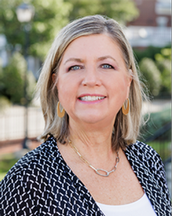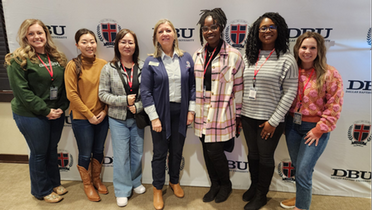Counseling Connections: February 2024

Welcome to Counseling Connections! We’re so glad you’re here!

For the February edition of Counseling Connections, we will focus on implementing change. In January, I saw a sign that read: "What is a New Year’s Resolution? A list for the first week of January!". For many, that is how long their resolution lasts, and many do not even make resolutions because they expect to fail. In Counseling Tips, we will look at why people often fail to meet goals and how we can help people be more successful. In Alumni Illumination, we are featuring Lauren Sikes, who is an August 2019 graduate of the Christian Counseling program, a schoolteacher, and a foster parent.
The Nexus Ministry Leadership Conference is on February 26th. The conference is free, but we do need you to register. I hope you will consider attending. For more information about the conference, visit the conference webpage. See you there.
I would also like to hear from you. What are you doing in ministry, or has there been a change in your ministry? Would you be willing to mentor a current student who is in the Ministry Mentorship class? Please contact me at dana@dbu.edu.
Mark Your Calendars
- Nexus Ministry Leadership Conference: February 26 (Located at DBU)
- Spring Break: March 11-15
- Good Friday Holiday: March 30
- Hope for the Heart and International Christian Coaching Institute Conference: September 26-28 (Located in Allen, TX)
- American Association of Christian Counselors Mega National Conference - Stand Strong: October 10-12 (Located in Dallas, TX)

Counseling Tips
Often when a person seeks counseling, they want change either in themselves or others. We need to be clear that we can help them change but not necessarily help them change someone else. It is also important that we acknowledge that transformational change, spiritual and deep change, comes through the empowering of the Holy Spirit. However, theologian Jerry Bridge writes about the concept of "dependent responsibility". As Christians, we must be dependent on the Holy Spirit but also recognize that we have responsibility for our behavior or change in behavior.
Gary Collins, in his book Christian Counseling: A Comprehensive Guide, 3rd edition, writes about the False Hope Syndrome. It begins with Unrealistic Expectations leading to a commitment to change (feelings of control) resulting in initial efforts (early success) but then resistance to change (change stops) followed by failure/abandon attempt and finding reasons for failure. Change is difficult. There are several guidelines we can share with the people we are helping. First, commitment is important, but it is not just a commitment to reach a goal but to maintain and not fall back into old habits. Second, goals need to be attainable or realistic and specific enough that you can measure progress. Third, predict relapse but minimize it. This can be done by identifying high-risk situations and avoiding them, learning coping skills or refusal skills, and developing a lifestyle to minimize temptations. Fourth, develop a support system of people who will encourage and provide accountability. Remember we do not change on our own, the Holy Spirit empowers us.
Dr. Gary Collins has been described as the father of Christian counseling. He also started the American Association of Christian Counselors. You may want to add his book, Christian Counseling: A Comprehensive Guide 3rd ed., to your library. He writes about many of the issues that Christian counselors address with those they are helping.
Alumni Illumination
Lauren Sikes ('19)
I am working as a middle school teacher and coach in Georgetown ISD. Since graduation, I have become a licensed foster parent and have fostered three children. A big part of the reason I pursued the degree in Christian Counseling was to learn more about trauma so that I would be better able to serve foster children.

My biggest takeaways were things that I learned in the Addictive and Compulsive Disorders class. I learned a lot about drugs and what they do to the brain. It has caused me to have more compassion for people who are addicted to drugs.
I would tell a prospective student that this is a great program that prepares you not only for a career in counseling but for life. Although I am not currently working as a counselor, I use the knowledge that I gained in the program in my day-to-day life.
Dr. Dana Wicker serves as the Director of the Master of Arts in Christian Counseling and as a Professor of Psychology and Counseling in the Graduate School of Ministry at DBU. She holds a Ph.D. in Counseling Psychology from the University of North Texas and completed her formal internship at the Dallas Child Guidance Clinic.








